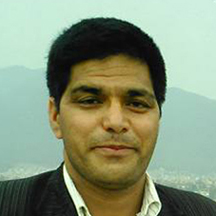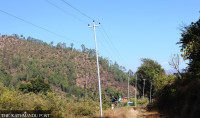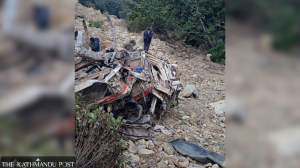Karnali Province
Faced with a lack of cash and employment opportunity, Kalikot locals who returned from India brace for an uncertain future
The local units do not have a concrete plan yet on how to tackle the mass unemployment that the crisis has wrought..jpg&w=900&height=601)
Tularam Pandey
Parajit BK from Palata Rural Municipality in Kalikot goes to India for work every year with two of his sons. Last year, the three had returned with Rs70,000 between the three of them. This year, however, they returned with barely Rs12,000. They returned home on February 22 because there were no jobs due to the Covid-19 pandemic.
“The work was just about to take off when the coronavirus hit,” 51-year-old BK said. Faced with a lack of employment opportunities at home, hundreds of men from Kalikot visit India every year for work. But this year was like no other. They returned home empty-handed and unsure how to make ends meet without work.
“Jobs in India is the only means of income for many families here,” said Lakshman Bam, chief of Palata Rural Municipality. “Everybody returned home this year frustrated.”
There are 2,700 households in the rural municipality and men from around 2,000 households migrate to India every year in search of jobs, according to Bam.
More than half of the district’s 23,000 households are dependent on income earned by their members in India, according to a recent data of the Poverty Alleviation Fund.
Birkha Sejuwal from Banjada has been visiting India to work for over a decade now. He works as a door-to-door salesman dealing in garments.
Like BK, Sejuwal also takes his two sons for the job. While BK managed to return with Rs12,000, Sejuwal and his sons returned virtually empty-handed.
“The business took a nosedive as the news of coronavirus spread,” Sejuwal said. Many villages in Kaliko are already reporting food shortages.
Officials at Raskot Municipality estimate the local market only has 80 quintals of rice and 10 quintals of lentils in stock.
Kalikot does not have enough fertile land to become agriculturally self-sustained. “Throughout the district, there are only around 300 families that can produce enough food to subsist on for three months,” Kashichandra Baral, the mayor of Raskot Municipality, said.
The influx of returnees from various Indian cities and overseas in the wake of the Covid-19 pandemic has raised concern regarding unemployment in the district.
The local units, however, do not have a concrete plan yet on how to deal with the problem of mass unemployment.
Bam, the chief of Palata Rural Municipality, said that the municipal office was planning to employ youths who had recently returned from India and other countries in development projects.
“Once the lockdown is lifted, we will have construction and drinking water projects up and running,” he said. “We will prioritise those who have returned from India while hiring workers for these projects. This, we hope, would provide some relief to them.”
Likewise, Tilagupha Municipality has plans to utilise the labour force in agriculture, Mayor Ratna Bahadur Shahi said.
“We will subsidise agriculture projects that the returnees want to pursue,” Shahi said. “With this, we want to change the idea that one has to move to India for employment.”
BK, however, is cynical that any of the plans floated by people’s representatives would actually be implemented. “I know how the local units work, one has to go through endless hassles to get even a simple thing done,” he said. “ I would be surprised if they come up with something that benefits us.”




 13.12°C Kathmandu
13.12°C Kathmandu












